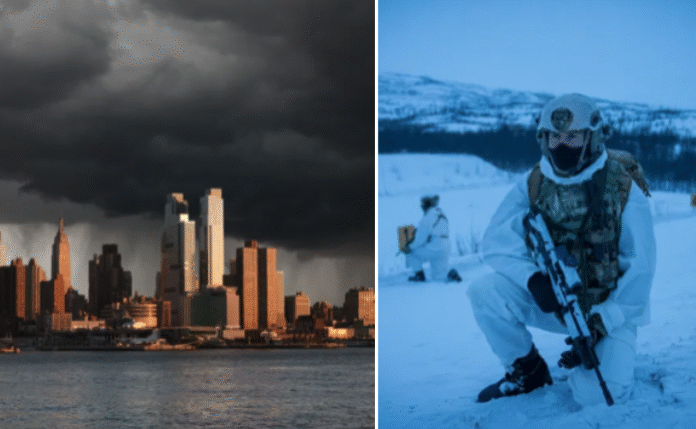Key Point Summary – Weather Wars Will Be Fought
- Experts warn militaries could use floods, droughts, and fog as weapons.
- Weather control has historical precedent in war and politics.
- Cloud seeding could trigger crop failure, famine, or flash floods.
- Rogue states or terrorists could unleash apocalyptic weather chaos.
- Risk of global instability as weather ignores national borders.
- UN banned hostile weather modification in 1977, but tech persists.
- Ethical fears grow over potential for catastrophic chain reactions.
Weaponised weather could be the next battlefield. Experts are sounding alarms over the terrifying possibility that nations — or even rogue groups — might soon fight wars by controlling the skies.
The scenario sounds like science fiction. But scientists warn it’s all too real. The goal? To cripple economies, break militaries, and paralyse entire countries with flash floods, bone-cracking freezes, or choking fog.
Cold War Fantasies Turned Modern Threat
During the Cold War, military leaders famously believed that controlling the weather meant controlling the world. Decades later, the tools are sharper, faster, and easier to access. Now, weather modification isn’t just theory — it’s been done.
From the Vietnam War to the 2008 Beijing Olympics, and even by Russia during one of Vladimir Putin’s grand military parades, nations have already tinkered with nature’s systems to gain an edge.
Today’s experts fear those experiments could be pushed into a far darker arena — one where the line between science and warfare disappears.
How the Sky Could Become a Weapon
Cloud seeding remains the most infamous tactic. Using aircraft, militaries could inject clouds with chemicals to increase rainfall, snow, or hail. In the right hands, it means breaking a drought. In the wrong hands, it’s a flood drowning cities.
Imagine: hailstones smashing fighter jets on the runway, tanks frozen in place by sudden ice storms, or warships swallowed in dense, artificial fog.
Hamish de Bretton-Gordon, a former chemical weapons adviser, calls it a “very plausible” weapon. Mix chemicals with clouds, and you could devastate crops or even create forms of chemical rain.
The Domino Effect No One Can Stop
Dr Alan Robock, a Rutgers University scientist, says battlefields could be cloaked in particle clouds to block enemy lasers or satellites. But the problem is control — or the lack of it.
The weather moves. It doesn’t respect borders. Rain intended for one target could fall hundreds of miles away, triggering disasters in countries that were never part of the conflict.
Senior meteorologist Johan Jaques warns this unpredictability could set off political crises. A flood in one country could easily lead to accusations, retaliation, and what he calls “tit-for-tat weather wars.”
Historical Proof — And Warnings
World War Two saw British forces literally burn away fog by igniting gasoline trenches along airfields. The technique worked — but it was crude and dangerous.
In Dubai, devastating floods in 2024 sparked speculation about botched cloud seeding. While no direct proof was found, the incident stands as a reminder: alter the weather, and you could unleash chaos you never intended.
Andrea Flossmann of the World Meteorological Organisation sums it up simply: “The atmosphere has no walls.” What starts in one sky can end in another.
The UN Ban That May Not Matter
In 1977, the United Nations outlawed the military use of environmental modification techniques. But experts say the technology still exists — and advances in drones, chemicals, and weather modelling have made it easier than ever to deploy.
Countries still run civil weather projects, aiming to help farmers or protect cities. Yet there’s no proof they always work as intended — and no guarantee they couldn’t be hijacked.
Public Fears Rising
Ordinary people are already suspicious. From conspiracy theories about “chemtrails” to real-world incidents like Dubai’s floods, public trust in weather control is low — and plummeting.
The thought of leaders, generals, or extremists holding the power to summon floods or droughts sparks both outrage and fear. In an unstable world, the temptation to use such weapons could be too great to resist.
The Outlook: A Storm on the Horizon
Experts agree — the technology is here, the ethics are not. Without strict global enforcement, the first “Weather War” might not be decades away. It could be triggered by a rogue nation, a desperate government, or even a terrorist group with enough money and access.
And once the sky itself becomes a battlefield, there’s no telling where the clouds — or the consequences — will drift.




